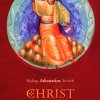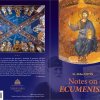The Serbian Orthodox Diocese of Western America is pleased to announce the publication of an outstanding book by Bishop Athanasius Yevtich, a disciple of the great twentieth-century theologian Archimandrite Justin Popovich. Bishop Athanasius' thought combines adherence to the teachings of the Church Fathers with a vibrant faith and a profound experience of Christ in the Church.
Christ - The Alpha and Omega is the first of a planned collection of works of contemporary Serbian theologians. It is an anthology of Bishop Athanasius' articles which have appeared in Serbian, Greek, French, English and Russian. Focusing on themes central to Christian patristic Triadology, Ecclesiology and Anthropology, the book reveals the ultimate purpose of man and the universe, and speaks of how each of us can realize this purpose within the divine-human community of the Orthodox Church. Bishop Athanasius reminds us that the God-man Jesus Christ is the Beginning and the End of all things, and that we must seek our own end, goal, and fulfillment in Him.
.The book is adorned with striking illustrations by Fr. Stamatis Skliris, a parish priest in Athens who is renowned as an iconographer and as a writer and lecturer on Byzantine iconography.
Contents
PART I
1. O Gentle Light
2. The Holy Fathers and the Holy Scriptures
3. Christ - The Land of the Living
PART II
4. Christ on Earth - The Land of the Living
5. The Anthropology of Hesychasm
6. The Creation of the World and Man
PART III
7. The Holy Sacrament of Baptism: Entrance into and Living in the Church
8. Liturgy and Spirituality
9. Eschatological Dimensions of the Church
10. The Eschata in Our Daily Life
PART IV
11. Between the "Nicaeans" and Easterners": The "Catholic" Confession of St. Basil
12. Icon and Incarnation of the Holy Fathers and St. John Damascene
13. The Teaching of St. John Damascene on the Most Holy Theotokos: Orthodox Theotokology
14. Socialism and the Ecclesial Community: A commentary on a text of Dostoyevsky
15. The Mystery of Touch: Holy Relics in Serbia - A True Physical Love. An interview
List of Sources
Index






